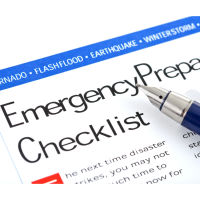Disasters Can Happen Here: Is Your Business Ready?
Storm Season is Here: Is Your Business Ready?
It’s easy to assume that major disasters only happen somewhere else. But if the past year has taught us anything, it’s that we are not immune.
Last year, Hart County was lucky when Hurricane Helene passed through. We didn’t experience major structural damage, but we did experience widespread power outages that lasted for days. The impact on our businesses was deeper than anticipated, especially for those without a plan in place.
And just this past weekend, Madison, Georgia, experienced devastating fires that destroyed several businesses. Our neighbors in Royston have seen two separate businesses destroyed by fire in recent years. These weren’t large metropolitan disasters—they happened in communities just like ours. Communities where people work hard, invest everything in their businesses, and expect each new day to look like the last.
We’re reminded again and again: disaster doesn’t always give you a warning, and it doesn’t discriminate by zip code.
That’s why we are encouraging all our local businesses, large and small, to take a few simple steps to prepare. Whether it’s a storm, a fire, or any unexpected emergency, a little planning can make the difference between days of downtime or bouncing back with confidence.
Top 10 Things Hart County Businesses Should Do Right Now
-
Update Your Emergency Plan
Ensure every team member knows what to do in a crisis: where to go, who to call, and how to keep the business running. -
Back Up Vital Records
Store secure digital and hard copies of financial, HR, client, and operations records. -
Check Your Insurance Coverage
Verify storm, fire, and flood protection. Update your inventory so you’re not scrambling to document losses later. -
Create a Communication Tree
Have a clear way to quickly reach employees, customers, and suppliers if disaster strikes. -
Test Remote Work Capabilities
If your space is inaccessible, make sure your team can still access systems and communicate. -
Assemble an Emergency Kit
Stock basics: flashlights, batteries, chargers, first-aid, backup power, and tools. -
Secure Your Property
Clear drains, trim trees, elevate electronics, check fire extinguishers, and test smoke alarms. -
Assign a Response Coordinator
Choose someone on your team to lead emergency response and communicate updates. -
Know Your Recovery Resources
Familiarize yourself with FEMA, SBA disaster assistance, and local recovery services before you need them. -
Bookmark These Key Tools
Preparedness Isn’t Panic—It’s Protection
We don't share this to cause fear. We share it because preparedness is something we can control, even when disaster isn't. Fires, storms, outages—they’re unpredictable, but your response doesn’t have to be.
The Hart County Chamber is here to support you. If you need help reviewing your plan, creating one, or learning about available resources, just give us a call.
Let’s make sure our community isn’t just reacting—we’re ready.
Hart County Chamber of Commerce
-
Amanda Brown President/CEO
- July 14, 2025
- (706) 376-8590
- Send Email

